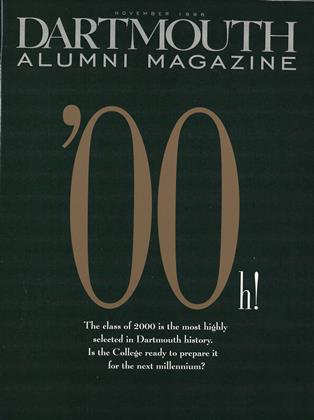Dartmouth has another scholarship. This time, the faculty paid for it.
There are 985 separate scholarship funds at the College. The smallest is the $358 that comprises the Class of 1846 Memorial Scholarship. Don't laugh. The $20 or so a year it pays was serious money back then. A year's tuition in 1847 costs 27, which is about one eight-hundredth of the present tuition.
And the largest fund? The largest is $10 million. That fund, though established quite recently, has already given major support to more than a hundred students.
But the fund I want to talk about is one of the middle-sized ones. It contains $50,102. Nothing unusual about that; there are lots of funds that hover around the $50,000 mark. There's an excellent reason: Fifty thousand is the current minimum for a named scholarship, one where the undergraduate who gets the money also gets the name—a Montgomery Scholar, a Collis Scholar , an O'Connor Scholar.
What's unusual about this fund is who put up the money. It's called the Dartmouth Faculty Scholarship, and, yes, the faculty paid for it. Sixty current faculty members and 20 emeriti contributed to the fund, our gifts ranging from $10 up to several donations of $ 1,000 and one each of $5,000 and $10,000. It has just gone into operation. Right now a member of the class of 2000, Yolanda Kuo, is the first holder.
You don't hear much about faculty donations, mostly because there are not a lot of faculty donations. Nor should there be. If we all regularly contributed a portion of our salaries back to the College, it would be sort of like a kid solemnly returning part of his or her allowance to help with household expenses. In an emergency, sure. As a reg- ular thing, absurd. The allowance is a house- hold expense, so it would merely shift money from one pocket to another.
All the same, I think it's good for the faculty to do a little giving once in a while, because we get so much in the habit of receiving. Not just what these days are fairly decent (and occasionally quite large) salaries, but endowed chairs, leave terms, research money, sabbaticals...the list is quite long. Just as kids should and sometimes do spend part of their allowance on others, faculty should occasionally donate back a little bit of what was donated to them.
This is a reflection that has occurred twice to members of the English Department. It first occurred back in the 1970s to Henry Terrie, who was a much admired chairman of the department and later dean of humanities. (And then went back to teaching, including his full share of freshman English.) The result was the first-ever faculty scholarship fund, only it was really a faculty-administration scholarship fund, because Henry got plenty out of his fellow deans and other administrators.
Then two years ago it occurred to Professor Jim Hefernan. He was flying home from London after a term spent profitably in research (with a few theaters thrown in), and it struck him what a marvelous life he led as a teacher at Dartmouth. Plenty of work, to be sure—especially all those papers, which Dartmouth faculty pretty much grade themselves. It also struck him how high tuition is, and how much of the reason, of course, is faculty salaries. And finally he thought about our need-blind admissions policy, and how six of the College's last eight Rhodes scholars have come from the 40 percent of the student body receiving financial aid.
Voila! Before the plane reached Boston, he had resolved to see if enough colleagues would join him so that one more undergrad could be spared part of that fierce tuition. Enough would. And Jim also got essential advice and help from two administrators in development: Rita Johnson and Lu Martin. But every one of the $50,102 came from faculty. The emeriti tended to be more generous than the active faculty, which is not surprising. After all, they no longer have college tuition for their kids to worry about. Being myself both an emeritus professor of English and a fairly active adjunct professor of environmental studies, I split my own modest contribution in two, and gave half as an emeritus and half as someone getting a salary paid in part by the Alumni Fund.
I don't think it's every faculty that sets up scholarships like these. But neither do I mean to sound too pious. It's no world record. Just to keep things in perspective, I should mention John McKetta, professor of chemical engineering emeritus at the University of Texas. Last year he donated a sum equal to his entire salary for the 49 years he taught there: a cool $964,335. (Actually, he rounded it off to a million.) Where did he get all the money? That's another story.
 View Full Issue
View Full Issue
More From This Issue
-
 Feature
FeatureCue the Millennium
November 1996 -
 Feature
FeatureA Billion Dollars
November 1996 By Rebecca Bailey -
 Feature
FeatureThe Inside Story
November 1996 By Karl Furstenberg -
 Cover Story
Cover StoryOught Ought
November 1996 By Joe Mehling '69 -
 Article
ArticleWhat Beethoven Heard
November 1996 By Kathleen Burge '89 -
 Article
ArticleA Two-for-One- Convocation and the Med School's 200th
November 1996 By E. Wheelock
Noel Perrin
-
 Books
BooksTHE LOST ART.
DECEMBER 1963 By NOEL PERRIN -
 Feature
FeatureTeaching at a Communist University
JUNE 1971 By NOEL PERRIN -
 Article
ArticleThe Prize Nobody Wins
JUNE 1978 By NOEL PERRIN -
 Article
ArticleMinor Issues
MAY 1996 By Noel Perrin -
 Article
ArticlePaving Paradise?
JANUARY 1997 By Noel Perrin -
 Article
ArticleThe Collis Silverware Mystery
NOVEMBER 1997 By Noel Perrin







